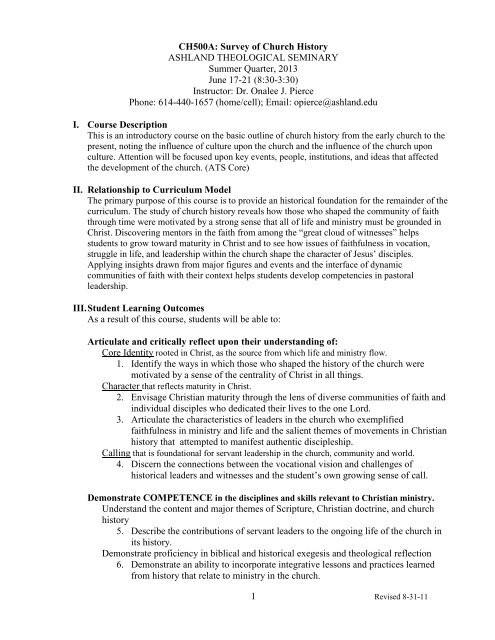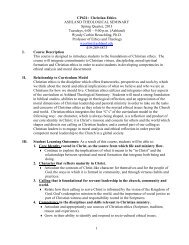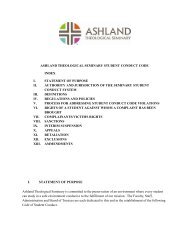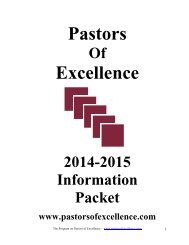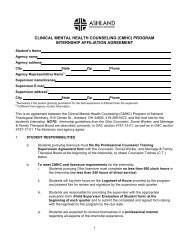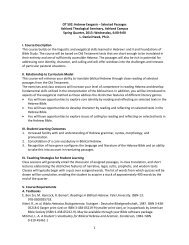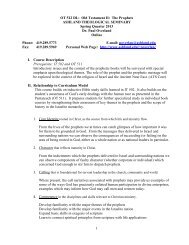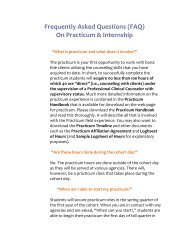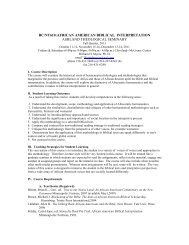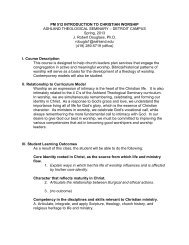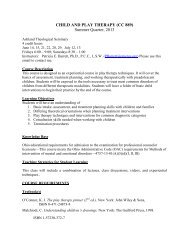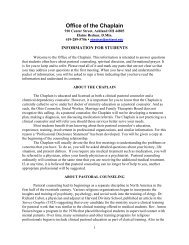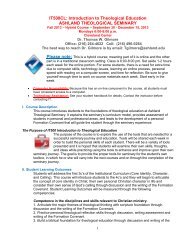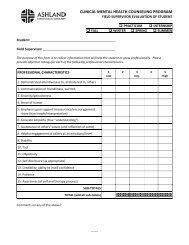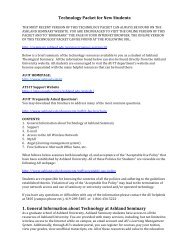Course Number: Course Name - Ashland Theological Seminary
Course Number: Course Name - Ashland Theological Seminary
Course Number: Course Name - Ashland Theological Seminary
Create successful ePaper yourself
Turn your PDF publications into a flip-book with our unique Google optimized e-Paper software.
CH500A: Survey of Church History<br />
ASHLAND THEOLOGICAL SEMINARY<br />
Summer Quarter, 2013<br />
June 17-21 (8:30-3:30)<br />
Instructor: Dr. Onalee J. Pierce<br />
Phone: 614-440-1657 (home/cell); Email: opierce@ashland.edu<br />
I. <strong>Course</strong> Description<br />
This is an introductory course on the basic outline of church history from the early church to the<br />
present, noting the influence of culture upon the church and the influence of the church upon<br />
culture. Attention will be focused upon key events, people, institutions, and ideas that affected<br />
the development of the church. (ATS Core)<br />
II. Relationship to Curriculum Model<br />
The primary purpose of this course is to provide an historical foundation for the remainder of the<br />
curriculum. The study of church history reveals how those who shaped the community of faith<br />
through time were motivated by a strong sense that all of life and ministry must be grounded in<br />
Christ. Discovering mentors in the faith from among the “great cloud of witnesses” helps<br />
students to grow toward maturity in Christ and to see how issues of faithfulness in vocation,<br />
struggle in life, and leadership within the church shape the character of Jesus’ disciples.<br />
Applying insights drawn from major figures and events and the interface of dynamic<br />
communities of faith with their context helps students develop competencies in pastoral<br />
leadership.<br />
III. Student Learning Outcomes<br />
As a result of this course, students will be able to:<br />
Articulate and critically reflect upon their understanding of:<br />
Core Identity rooted in Christ, as the source from which life and ministry flow.<br />
1. Identify the ways in which those who shaped the history of the church were<br />
motivated by a sense of the centrality of Christ in all things.<br />
Character that reflects maturity in Christ.<br />
2. Envisage Christian maturity through the lens of diverse communities of faith and<br />
individual disciples who dedicated their lives to the one Lord.<br />
3. Articulate the characteristics of leaders in the church who exemplified<br />
faithfulness in ministry and life and the salient themes of movements in Christian<br />
history that attempted to manifest authentic discipleship.<br />
Calling that is foundational for servant leadership in the church, community and world.<br />
4. Discern the connections between the vocational vision and challenges of<br />
historical leaders and witnesses and the student’s own growing sense of call.<br />
Demonstrate COMPETENCE in the disciplines and skills relevant to Christian ministry.<br />
Understand the content and major themes of Scripture, Christian doctrine, and church<br />
history<br />
5. Describe the contributions of servant leaders to the ongoing life of the church in<br />
its history.<br />
Demonstrate proficiency in biblical and historical exegesis and theological reflection<br />
6. Demonstrate an ability to incorporate integrative lessons and practices learned<br />
from history that relate to ministry in the church.<br />
1 Revised 8-31-11
7. Demonstrate attentiveness to contextuality through the examination and<br />
discussion of events in historical context for the purpose of becoming<br />
increasingly competent contextual exegetes today.<br />
Critically reflect on one’s own religious tradition and appreciate other traditions<br />
8. Translate the discoveries of the course into practical forms/actions that will shape<br />
or inform contemporary practices within the community of faith.<br />
IV. Teaching Strategies for Student Learning<br />
This course will utilize a combination of learning strategies including: lecture, discussion,<br />
small groups, various visual aids, student-led discussions, and reflections.<br />
V. <strong>Course</strong> Requirements<br />
A. Textbook(s) and Other Readings<br />
Dowley, Tim, ed. Introduction to the History of Christianity, rev. ed. Minneapolis:<br />
Fortress Press, 2002. ISBN: 0800634969 (ISBN: 0800638123 offers a CD-ROM<br />
study guide).<br />
*You will need access to the internet for the primary source readings. I recommend<br />
copying the assignments from the webpage and pasting the required sections into a word<br />
processing program (then you can make the selection the desired font size, etc. and you<br />
don’t have to worry about all the miscellaneous material in the margins of the webpage).<br />
Please bring the day’s primary source reading with you to class, either printed out or<br />
saved on a laptop.<br />
**It is recommended that you have the Dowley reading for the course done before class<br />
begins, but it is not required (the final exam will be given three weeks after our last class<br />
session, so you have until then to be completely caught up). However, you MUST have<br />
the primary source readings done for each session because we will be discussing them<br />
each time we meet.<br />
B. Attendance<br />
According to the student handbook, attendance at all class sessions is expected unless the<br />
professor has been notified in advance. Any student missing the equivalent of six class<br />
hours will be required to do additional work, receive a lower grade or withdraw from the<br />
class; this is at the discretion of the professor. This policy also includes tardiness.<br />
C. Assignments/Assessment of Student Learning<br />
Note: Students must place their student mailbox number on the cover page on all papers.<br />
Students without a mailbox: provide the professor with a self-addressed stamped envelope.<br />
<br />
Historical Sketches (15% each). You will choose one person for each of four<br />
historical sketches. You may choose the subject for each of your sketches. However,<br />
you must read at least 10 pages from a primary source 1 either written by the person<br />
or about him or her at the time. It is highly recommended that you choose people<br />
1 For more information about what constitutes a primary source, please see Kate L. Turabian, A<br />
Manual for Writers of Research Papers, Theses, and Dissertations, 7th edition (Chicago: University<br />
of Chicago Press, 2007), 25. If you have remaining questions, please contact me.<br />
2 Revised 8-31-11
from a variety of backgrounds and/or theologies. (Don’t be afraid to choose someone<br />
with whom you disagree!) The format for the sketches is attached to the end of the<br />
syllabus (pg 10). For the first sketch, the person should be from the 100 CE- 500 CE<br />
and is due June 15 (Note that this is the Saturday before class starts. If you have any<br />
questions about this first sketch, please contact me). The subject of the second sketch<br />
should be from 500 CE- 1000 CE and is due June 22. The third sketch should focus<br />
on a person from 1000 CE- 1500CE and is due June 29. The fourth sketch will be<br />
on a figure from 1500 CE to the present and is due July 6.<br />
Discussion Facilitator (15%). Each student will sign up to lead the primary source<br />
discussion time for one session. Email the instructor by Friday, June 7th with your<br />
top two choices of sessions to be the facilitator. As the facilitator, you should work<br />
through the relevant primary sources carefully and prepare enough discussion<br />
questions for a 30-minute discussion. Where appropriate, you should also bring in<br />
points from the Dowley text and points of application of the material for the church<br />
today. You will turn in your list of questions to the instructor the session in which<br />
you present.<br />
Final Exam (25%). The final exam will be comprehensive and will have two parts.<br />
The objective section (multiple choice/ matching/ true or false/ etc.) and a short<br />
answer identification section will be taken on ANGEL on July 13. The test will be<br />
open from 8:00am-11:00pm. You may take the test any time within that window and<br />
you will have 75 minutes to complete the test once you begin. A study guide will be<br />
given on the last day of class. The second part of the final exam will consist of two<br />
comprehensive essay questions to be answered in a take-home format. The questions<br />
will be given with the study guide and are due at the time of the final exam and will<br />
be submitted via an ANGEL drop-box on July 13.<br />
D. Calculation of Grade<br />
Assignments Learning Outcomes Percent of Final Grade<br />
Historical Sketches 1, 2, 3, 4, 5, 7, 8 60%<br />
Discussion Facilitator 1, 2, 3, 4, 6, 7, 8 15%<br />
Final Exam 3, 5, 6, 7 25%<br />
VI. Tentative <strong>Course</strong> Schedule<br />
Session Date(s) Lecture/Topic Readings/Assignments<br />
#<br />
1 June 17,<br />
morning<br />
Introduction to the<br />
<strong>Course</strong><br />
Dowley, 14-25; 37-43; 56-81<br />
2 June 17,<br />
afternoon<br />
Background and the<br />
Early Church<br />
The Church in<br />
<strong>Theological</strong> Debate<br />
“The Martyrdom of Polycarp,” from<br />
http://www.earlychristianwritings.com/text/martyrdompol<br />
ycarp-lake.html<br />
Dowley, 82-122; 164-194; 204-211<br />
Irenaeus, Against Heresies, “Preface” from<br />
http://www.newadvent.org/fathers/0103100.htm<br />
Augustine, Confessions, Book VIII from<br />
3 Revised 8-31-11
http://www.newadvent.org/fathers/110108.htm<br />
3 June 18,<br />
morning<br />
The Medieval Church Dowley, 226-246; 260-303<br />
Unam Sanctum, from<br />
http://www.fordham.edu/halsall/source/b8-unam.html<br />
Rule of St. Benedict, choose 2 chapters, from<br />
http://www.osb.org/rb/text/toc.html<br />
4 June 18,<br />
afternoon<br />
5 June 19,<br />
morning<br />
Calls for Reform Dowley, 307-315; 320-350<br />
Foxe’s Book of Martyrs, Chapter VIII from<br />
http://www.gospelweb.net/FoxeMartyrs/FS_FoxeMartyrs<br />
.htm<br />
The Reformation Dowley, 366-394<br />
Martin Luther, “Ninety-Five Theses,” from<br />
http://www.luther.de/en/95thesen.html<br />
6 June 19,<br />
afternoon<br />
7 June 20,<br />
morning<br />
8 June 20,<br />
afternoon<br />
9 June 21,<br />
morning<br />
10 June 21,<br />
afternoon<br />
Reformation, cont.<br />
Scholasticism &<br />
Rationalism<br />
Christianity in<br />
America<br />
Christianity in<br />
America<br />
The Global Church of<br />
the 19th and 20th<br />
Centuries<br />
NO CLASS<br />
Dowley, 401-434; 485-506<br />
“Schleitheim Confession of Faith,” “The Cover Letter<br />
[Introductory]” and “the Seven Articles,” from<br />
http://www.gameo.org/encyclopedia/contents/S345.html<br />
Dowley, 436-461<br />
Jonathan Edwards, “Sinners in the Hands of an Angry God,”<br />
from<br />
http://www.ccel.org/ccel/edwards/sermons.sinners.html<br />
Charles Finney, Lectures on Revival of Religion, Lecture I,<br />
from<br />
http://www.ccel.org/ccel/finney/revivals.iii.i.html<br />
Dowley, 518-547; 646-653<br />
Harry E. Fosdick, “Shall the Fundamentalists Win?” from<br />
http://historymatters.gmu.edu/d/5070/<br />
Martin Luther King, Jr, “Letter from Birmingham Jail,” from<br />
http://abacus.bates.edu/admin/offices/dos/mlk/letter.html<br />
Dowley, 557-570; 628-645; 660-672<br />
Elizabeth Isichei, A History of Christianity in Africa, 323-352<br />
(will be available on ANGEL as a pdf file).<br />
(The final exam will take place on July 13, via ANGEL.)<br />
4 Revised 8-31-11
VII. Other <strong>Course</strong> Instructions<br />
A. Writing Guidelines<br />
When writing your papers, please follow these general guidelines: use 12-point Times New<br />
Roman or Courier New fonts only; use one inch margins; use Turabian formatting for<br />
citations; when in doubt, include a citation. For this course, all papers must be submitted<br />
via ANGEL drop-boxes. This saves a vast amount of paper and allows the instructor to spotcheck<br />
for plagiarism.<br />
B. Late Policy<br />
Assignments turned in after the deadline will be docked five points for each day late, unless<br />
permission to do otherwise was granted by the professor ahead of time.<br />
VIII. Recommendations for Lifelong Learning<br />
As you participate in this course and engage in the material, you will encounter figures who<br />
intrigue you. Make note of these and, as you continue on in your seminary career and in<br />
your ministry, bring these people along with you. Continue to investigate them, allowing<br />
their life-lessons and wisdom to permeate your walk.<br />
Also, the Selected Bibliography below contains many wonderful resources which may<br />
further enrich your appreciation for church history. You may also want to consider<br />
consulting journals such as Church History and Fides et Historia.<br />
IX. <strong>Seminary</strong> Guidelines<br />
A. ATS Academic Integrity Policy<br />
<strong>Ashland</strong> <strong>Theological</strong> <strong>Seminary</strong> seeks to model servant leadership derived from biblical standards of<br />
honesty and integrity. We desire to encourage, develop, and sustain men and women of character<br />
who will exemplify these biblical qualities in their ministry to the church and the world. As<br />
members of the seminary community, students are expected to hold themselves to the highest<br />
standards of academic, personal, and social integrity. All students, therefore, are expected to abide<br />
by the academic integrity standards outlined in the Student Handbook.<br />
B. Academic Support Services<br />
If you need assistance with writing projects for your coursework, contact the ATS Academic Support<br />
Center. The center provides free sessions with a peer consultant who can help you with all of your<br />
concerns about academic support including writing, critical thinking, documentation, reading skills,<br />
study skills, test taking skills, time management. Contact the center if you have a question about<br />
how to complete your assignment, if you have documentation questions, or if you would like to have<br />
your paper evaluated for areas needing improvement. The ATS Academic Support Center can be<br />
reached at 419-289-5162 or by e-mail at atswc@ashland.edu.<br />
C. Students with Disabilities<br />
Students with documented disabilities who require academic adjustments for this class are<br />
requested to contact me to discuss reasonable accommodations. While not required, it is in the best<br />
interest of the student to have this conversation early in the semester. In order to receive academic<br />
adjustments paperwork from Disability Services must be provided to document this need.<br />
Disability Services is located in 105 Amstutz, extension 5953 (419-289-5953).<br />
5 Revised 8-31-11
D. ATS Grading Scale<br />
Grade Percent Description<br />
A 97-100 Superior achievement of course objectives, diligence and originality, high degree<br />
of freedom from error, outstanding evidence of ability to utilize course<br />
knowledge, initiative expressed in preparing and completing assignments,<br />
positive contributions verbalized in class.<br />
A- 92-96<br />
B+ 89-91<br />
B 86-88 Good work submitted, commendable achievement of course objectives, some<br />
aspects of the course met with excellence, substantial evidence of ability to utilize<br />
course material, positive contributions verbalized in class, consistency and<br />
thoroughness of work completed.<br />
B- 83-85<br />
C+ 80-82<br />
C 77-79 Acceptable work completed, satisfactory achievement of course objectives,<br />
demonstrating at least some ability to utilize course knowledge, satisfactory class<br />
contribution.<br />
C- 74-76<br />
D+ 71-73<br />
D 68-70 Passing but minimal work, marginal achievement of course objectives, poor<br />
performance in comprehension of work submitted, inadequate class contributions.<br />
D- 65-67<br />
F Below 65 Unacceptable work resulting in failure to receive class credit, inadequacy of work<br />
submitted or of performance and attendance in class.<br />
X. Selected Bibliography or References<br />
General Texts<br />
Barrett, David B. World Christian Encyclopedia. New York: Oxford, 1982.<br />
Brauer, Jerald C. The Westminster Dictionary of the Christian Church. Westminster, 1971.<br />
Cross, L. and E.A. Livingsone, eds. The Oxford Dictionary of the Christian Church. New York: Oxford, 1974.<br />
Douglas, J.D. The New International Dictionary of the Christian Church. Grand Rapids: Zondervan, 1974.<br />
González, Justo L. A History of Christian Thought, 3 vols., rev. ed. Nashville: Abingdon, 1987.<br />
__________. The Story of Christianity: The Early Church to the Present Day. Peabody, MA: Prince Press, 1985.<br />
Latourette, Kenneth Scott. A History of Christianity, 2 vols., rev. ed. Peabody, MA: Prince Press, 1975.<br />
Shelley, Bruce L. Church History in Plain Language, 2nd ed. Nashville: Nelson, 1995.<br />
Walker, Williston. A History of the Christian Church. Charles Scribner’s Sons, 1985.<br />
Anthologies<br />
Bettenson, H. Documents of the Christian Church. New York: Oxford University Press.<br />
Bindley, T.H. and F.W. Green. The Oecumenical Documents of the Faith. Methuen.<br />
McGrath, Alister. Christian Literature: An Anthology. Whiley.<br />
Oden, Amy. In Her Words: Women’s Writings in the History of Christian Thought. Nashville: Abingdon, 1994.<br />
Stevenson, J. Creeds, Councils and Controversies (371-461). SPCK.<br />
__________. A New Eusebius. SPCK.<br />
Van Voorst, Robert E. Readings in Christianity. Wadsworth.<br />
Multi-Volume Series<br />
The Cambridge History of Christianity. New York: Cambridge University Press, 2008.<br />
Classics of Western Spirituality. Paulist Press.<br />
IVP Histories Series<br />
Library of Christian Classics. Westminster.<br />
Library of Protestant Thought. Oxford University Press.<br />
The Pelican History of the Church. Penguin Books.<br />
SPCK Church History Series (TEF Volumes)<br />
6 Revised 8-31-11
Early Church History/Patristics<br />
Anderson, Graham. Sage, Saint, and Sophist: Holy Men and Their Associates in the Early Roman Empire. New<br />
York: Routledge, 1994.<br />
Anti-Nicene Fathers. Eerdmans.<br />
Casiday, Augustine and Frederick W. Norris, eds. Constantine to c. 600. New York: Cambridge University Press,<br />
2007.<br />
Denzey, Nicola. The Bone Gatherers: The Lost Worlds of Early Christian Women. Boston: Beacon Press, 2007.<br />
Dungan, David L. Constantine's Bible: Politics and the Making of the New Testament. Minneapolis: Fortress, 2007.<br />
Harris, W.V., ed. The Spread of Christianity in the First Four Centuries: Essays in Explanation. Boston: E.J. Brill,<br />
2005.<br />
Humphries, Mark. Communities of the Blessed: Social Environment and Religious Change in Northern Italy, AD<br />
200-400. New York: Oxford University Press, 2000.<br />
Jurgens, William A. The Faith of the Early Fathers, 3 vols. Collegeville, MN: Liturgical Press.<br />
Kelly, J.N.D. Early Christian Doctrines. A & C Black, 1977.<br />
__________. Early Christian Creeds. New York: Longman, 1972.<br />
Lyman, Rebecca. Early Christian Traditions. Cambridge: Cowley Publications, 1999.<br />
Nasrallah, Laura and Elisabeth Schüssler Fiorenza, eds. Prejudice and Christian beginnings: Investigating Race,<br />
Gender, and Ethnicity in Early Christian Studies. Minneapolis: Fortress Press, 2009.<br />
Pelikán, Jaroslav. The Excellent Empire: the Fall of Rome and the Triumph of the Church. San Francisco: Harper,<br />
1990.<br />
Räisänen, Heikki. The Rise of Christian Beliefs: The Thought World of Early Christians. Minneapolis: Fortress<br />
Press, 2010.<br />
Schwiebert, Jonathan. Knowledge and the Coming Kingdom : the Didache's Meal Ritual and Its Place in Early<br />
Christianity. New York: T & T Clark, 2008.<br />
Verbrugge, Verlyn D. Early Church History. Grand Rapids: Zondervan, 1998.<br />
Young, Frances. From Nicea to Chalcedon. Fortress, 1983.<br />
Middle Ages<br />
Bornstein, Daniel E., ed. Medieval Christianity. Minneapolis: Fortress Press, 2009.<br />
Bredero, Adriaan H. Christendom and Christianity in the Middle Ages : the Relations between Religion, Church,<br />
and Society. Translated by Reinder Bruinsma. Grand Rapids: Eerdmans, 1994.<br />
Chadwick, Henry. East and West: the Making of a Rift in the Church : from Apostolic Times until the Council of<br />
Florence. New York: Oxford University Press, 2003.<br />
Colish, Marcia L. Medieval Foundations of the Western Intellectual Tradition, 400-1400. New Haven: Yale<br />
University Press, 1997.<br />
Fletcher, Richard. The Barbarian Conversion: from Paganism to Christianity. New York: H. Holt and Co., 1998.<br />
Freeman, Charles. The Closing of the Western Mind: the Rise of Faith and the Fall of Reason. New York: A.A.<br />
Knopf, 2003.<br />
Geary, Patrick J. Readings in Medieval History, 3rd ed. Toronto: Broadview Press, 2003.<br />
Knowles, David. Christian Monasticism. McGraw-Hill, 1990.<br />
Lynch, Joseph H. The Medieval Church: A Brief History. New York: Longman, 1992.<br />
MacMullen, Ramsay. Christianity and Paganism in the Fourth to Eighth Centuries. New Haven: Yale University<br />
Press, 1997.<br />
Noble, Thomas F.X. and Julia M. H. Smith. Early Medieval Christianities, c. 600-c. 1100. New York: Cambridge<br />
University Press, 2008.<br />
Runciman, Steven. History of the Crusades, 3 vols. Penguin Books, 1971.<br />
Vauchez, André. The Laity in the Middle Ages: Religious Beliefs and Devotional Practices. South Bend: University<br />
of Notre Dame Press, 1993.<br />
Volz, Carl A. The Medieval Church: From the Dawn of the Middle Ages to the Eve of the Reformation. Nashville:<br />
Abingdon, 1997.<br />
Reformation<br />
Bogchi, David and David C. Steinmetz, eds. The Cambridge Companion to Reformation Theology. Cambridge:<br />
Cambridge University Press, 2004.<br />
Bouwsma, William A. John Calvin: A Sixteenth-Century Portrait. New York: Oxford University Press, 1988.<br />
Brady, Thomas, Heiko A. Oberman, and James Tracy, eds. Handbook of European History, 1400-1600. Leiden:<br />
Brill, 1995.<br />
Cameron, Euan. The European Reformation. New York: Oxford University Press, 1991.<br />
7 Revised 8-31-11
Diefendorf, Barbara B. Beneath the Cross: Catholics and Huguenots in Sixteenth-Century Paris. New York:<br />
Oxford University Press, 1991.<br />
George, Timothy. Theology of the Reformers. Nashville: Broadman & Holman, 1999.<br />
Gregory, Brad S. Salvation at Stake: Christian Martyrdom in Early Modern Europe. Harvard Historical Series, no.<br />
134. Cambridge: Harvard University Press, 1999.<br />
Hillerbrand, Hans Joachim. Historical Dictionary of the Reformation and Counter-Reformation. Lanham, MD:<br />
Scarecrow Press, 2000.<br />
Maag, Karin, ed. Melanchthon in Europe: His Work and Influence Beyond Wittenberg. Grand Rapids: Baker,<br />
1999.<br />
Marshall, Sherrin, ed. Women in Reformation and Counter-Reformation Europe: Public and Private Worlds.<br />
Bloomington: Indiana University Press, 1989.<br />
McGrath, Alister. Reformation Thought: An Introduction. Malden, MA: Blackwell, 1999.<br />
Oberman, Heiko A. The Dawn of the Reformation: Essays in Late Medieval and Early Reformation Thought.<br />
London: T and T Clark, 1986.<br />
__________. Luther: Man Between God and the Devil. Translated by Eileen Walliser-Schwarzbart. New York:<br />
Doubleday, 1989.<br />
Ozment, Steven. When Fathers Ruled: Family Life in Reformation Europe. Cambridge: Harvard University Press,<br />
1983.<br />
Scribner, R.W. For the Sake of Simple Folk: Popular Propaganda for the German Reformation. Oxford: Oxford<br />
University Press, 1994.<br />
Weber, Max. The Protestant Ethic and the Spirit of Capitalism (there are many translations and editions of this<br />
book available).<br />
Whiting, Robert. Local Responses to the English Reformation. New York: St. Martin’s Press, 1998.<br />
Williams, George H. The Radical Reformation. Westminster, 1962.<br />
Scholasticism/Rationalism<br />
Armstrong, Brian G. Calvinism and the Amyraut Heresy: Protestant Scholasticism and Humanism in Seventeenth-<br />
Century France. Madison: University of Wisconsin Press, 1969.<br />
Barnett, S.J. The Enlightenment and Religion: the Myths of Modernity. New York: Manchester University Press,<br />
2003.<br />
Brown, Dale. Understanding Pietism. Grand Rapids: Eerdmans, 1978.<br />
Byrne, James M. Religion and the Enlightenment: from Descartes to Kant. Louisville: Westminster John Knox<br />
Press, 1997.<br />
Clark, Kelly James. Return to Reason: a Critique of Enlightenment Evidentialism, and a Defense of Reason and<br />
Belief in God. Grand Rapids: Eerdmans, 1990.<br />
Frei, Hans. The Eclipse of the Biblical Narrative: A Study in Eighteenth- and Nineteenth- Century Hermeneutics.<br />
New Haven: Yale University Press, 1974.<br />
Gay, Peter. The Enlightenment, 2 vols. Knopf, 1966-69.<br />
Muller, Richard A. After Calvin: Studies in the Development of a <strong>Theological</strong> Tradition. New York: Oxford<br />
University Press, 2003.<br />
__________. Post-Reformation Reformed Dogmatics: the Rise and Development of Reformed Orthodoxy, ca. 1520<br />
to ca. 1725. Grand Rapids: Baker Academic, 2003.<br />
Scholder, Klaus. The Birth of Modern Critical Theology: Origins and Problems of Biblical Criticism in the<br />
Seventeenth Century. Translated by John Bowden. Philadelpia: Trinity Press International, 1990.<br />
Spinoza, Benedict. A Theologico-Political Treatise. New York: Dover, 1951.<br />
Stoeffler, F. Ernst. German Pietism during the Eighteenth Century. E.J. Brill, 1973.<br />
van Asselt, Willem J. and Eef Dekker. Reformation and Scholasticism: an Ecumenical Enterprise. Grand Rapids:<br />
Baker Academic, 2001.<br />
Wolfe, Michael, ed. Changing Identities in Early Modern France. Durham: Duke University Press, 1997.<br />
American Church History<br />
Ahlstrom, Sydney E. A Religious History of the American People. New Haven: Yale University Press, 1972.<br />
Blumhofer, Edith. Aimee Semple McPherson: Everybody’s Sister. Grand Rapids: William B. Eerdmans, 1993.<br />
Braude, Ann. Radical Spirits: Spiritualism and Women’s Rights in Nineteenth-Century America, 2 d ed.<br />
Bloomington, Ind.: University of Indiana Press, 2001.<br />
Cott, Nancy F. Bonds of Womanhood: “Woman’s Sphere” in New England, 1780-1835. New Haven: Yale<br />
University Press, 1977.<br />
Danaher, William J. The Trinitarian Ethics of Jonathan Edwards. Columbia Series in Reformed Theology.<br />
Louisville: Westminster John Knox Press, 2004.<br />
8 Revised 8-31-11
Douglas, Ann. The Feminization of American Culture. New York: Knopf, 1977.<br />
Epstein, Barbara Leslie. The Politics of Domesticity: Women, Evangelism, and Temperance in Nineteenth-Century<br />
America. Middletown, Conn.: Wesleyan University Press, 1981.<br />
Gaustad, Edwin and Leigh Schmidt. The Religious History of America: The Heart of the American Story from<br />
Colonial Times to Today, rev. ed. San Francisco: Harper, 2002.<br />
Hatch, Nathan O. The Democratization of American Christianity. New Haven:Yale University Press, 1989.<br />
Holifield, E. Brooks. Theology in America: Christian Thought from the Age of the Puritans to the Civil War. New<br />
Haven: Yale University Press, 2003.<br />
Keller, Rosemary Skinner, and Rosemary Radford Ruether, eds. Encyclopedia of Women and Religion in North<br />
America. Bloomington, Ind.: Indiana University Press, 2006.<br />
Kidd, Thomas S. The Great Awakening: The Roots of Evangelical Christianity in Colonial America. New Haven:<br />
Yale University Press, 2007.<br />
Marsden, George. Fundamentalism and American Culture: The Shaping of Twentieth-Century Evangelicalism.<br />
New York: Oxford University Press, 1982.<br />
McGreevy, John T. Catholicism and American Freedom: A History. New York: W.W. Norton & Company, 2003.<br />
Noll, Mark A. America’s God: from Jonathan Edwards to Abraham Lincoln. New York: Oxford, 2002.<br />
__________. A History of Christianity in the United States and Canada. Grand Rapids: William B. Eerdmans,<br />
1992.<br />
Raboteau, Albert J. A Fire in the Bones: Reflections on African-American Religious History. Boston: Beacon<br />
Press, 1996.<br />
Smith, Christian. American Evangelicalism: Embattled and Thriving. Chicago: University of Chicago Press, 1998.<br />
Smith, Timothy L. Revivalism and Social Reform: American Protestantism on the Eve of the Civil War. Baltimore:<br />
Johns Hopkins University Press, 1980.<br />
Soper, J. Christopher. Evangelical Christianity in the United States and Great Britain: Religious Beliefs, Political<br />
Choices. London: Macmillan, 1994.<br />
Stoeffler, F. Ernest, ed. Continental Pietism and Early American Christianity. Eugene, OR: Wipf & Stock<br />
Publishers, 2007.<br />
Global Christianity<br />
Ambacher, Henry B. Under the Shadow of the Dragon: the Growth of God's Church in Hong Kong. Harrisburg,<br />
PA: Association of Baptists for World Evangelism, 2003.<br />
Angold, Michael. Byzantium. St. Martin’s Press, 2001.<br />
Bays, Daniel H., ed. Christianity in China: from the Eighteenth Century to the Present. Stanford: Stanford<br />
University Press, 1996.<br />
Bergunder, Michael. The South Indian Pentecostal Movement in the Twentieth Century. Grand Rapids: Eerdmans,<br />
2008.<br />
Clark, Donald N. Christianity in Modern Korea. University Press, 1986.<br />
Drummond, Richard H. A History of Christianity in Japan. Grand Rapids: Eerdmans, 1971.<br />
Drussel, Enrique D. A History of the Church in Latin America. Grand Rapids: Eerdmans, 1981.<br />
Dyrness, William A. Emerging Voices in Global Theology. Grand Rapids: Zondervan, 1994.<br />
Gilley, Sheridan and Brian Stanley. World Christianities, c. 1815-1914. New York: Cambridge University Press,<br />
2006.<br />
Goodpasture, H. McKennie. Cross and Sword: an Eyewitness History of Christianity in Latin America. Maryknoll,<br />
NY: Orbis Books, 1989.<br />
Hastings, Adrian. The Church in Africa, 1450-1950. New York: Oxford University Press, 1994.<br />
Isichei, Elizabeth. A History of Christianity in Africa: from Antiquity to Present. London: SPCK, 1995.<br />
Jenkins, Philip. The Next Christendom: the Coming of Global Christianity, rev. ed. New York: Oxford University<br />
Press, 2007.<br />
Kalu, Ogbu U., ed. Interpreting Contemporary Christianity: Global Processes and Local Identities. Grand Rapids:<br />
Eerdmans , 2008.<br />
Lewis, Donald M. Christianity Reborn: the Global Expansion of Evangelicalism in the Twentieth Century. Grand<br />
Rapids: Eerdmans, 2004.<br />
McLeod, Hugh, ed. World Christianities c. 1914-c. 2000. New York: Cambridge University Press, 2006.<br />
Neill, Stephen. A History of Christianity in India. Cambridge: Cambridge University Press, 1984.<br />
Shenk, Wilbert R. Enlarging the Story: Perspectives on Writing World Christian History. Maryknoll, NY: Orbis<br />
Books, 2002.<br />
Suman, Michael D. The Church in China : One Lord Two Systems. Bangalore, India: SAIACS Press, 2006.<br />
Ware, Timothy. The Orthodox Church. Penguin, 1993.<br />
9 Revised 8-31-11
HISTORICAL SKETCH FORMAT<br />
I. Context<br />
What are some events/ church happenings/ theologies that may have shaped the life<br />
and ministry of the person? Briefly describe the culture of the day. (NB—this section should<br />
not include details about the person’s life.)<br />
*2-3 paragraphs<br />
II. Background information<br />
Describe what is known (or in some cases, may be logically inferred) about the person’s life<br />
before he/she became prominent (such as details about the person’s family life, childhood,<br />
education/ training, etc.).<br />
*1-2 paragraphs<br />
III. Ministry information<br />
Discuss aspects such as calling into ministry, distinctive characteristics, the primary<br />
influencers in the person’s life, obstacles in ministry, climactic moments, distinctive<br />
thoughts/ theologies, writings, etc. You decide what is most important to include.<br />
*3-4 paragraphs<br />
IV. Present Day Applications<br />
With an understanding of the cultural differences, what are some aspects of the individual’s<br />
life that can be applied to ours? Think of both positives and negatives (i.e., things to emulate<br />
and things to avoid). You may use first person here, but ONLY here.<br />
*2-3 paragraphs<br />
V. Bibliography<br />
You should use at least three scholarly secondary sources and only one may be from the<br />
internet (the Dowley text does not qualify as one of these sources, though you should<br />
include it in your bibliography if you did use it as a source). You are strongly encouraged to<br />
reference journal articles when possible. Additionally, one source must be a primary source<br />
(this may be from the internet).<br />
**The total page count should be 3-4 pages total, double spaced**<br />
10 Revised 8-31-11


